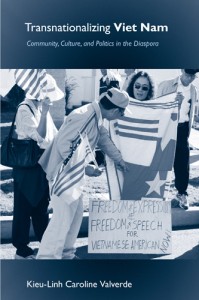Recently, there’s been a wave of new critical work on Vietnamese and Vietnamese diasporic literature, culture, and the refugee/immigrant experience. Here is a preview of Kieu-Linh Caroline Valverde’s monograph, Transnationalizing Viet Nam, which takes up the transnational connections of Viet Nam with communities in the homeland and throughout the diaspora.
[before we begin: like diaCRITICS? why not subscribe? see the options to the right, via feedburner, email, and networked blogs]
Transnationalizing Viet Nam: Community, Culture, and Politics in the Diaspora
 by Kieu-Linh Caroline Valverde
by Kieu-Linh Caroline Valverde
Asian American History and Culture Series
Temple University Press
cloth EAN: 978-1-43990-679-8 | ISBN: 1-4399-0679-3
Not yet published
E-Book EAN: 978-1-43990-681-1 | ISBN: 1-4399-0681-5
October 5, 2012
198 pages
6×9
From the Publisher
Vietnamese diasporic relations affect—and are directly affected by—events in Viet Nam. In Transnationalizing Viet Nam, Kieu-Linh Caroline Valverde explores these connections, providing a nuanced understanding of this globalized community. Valverde draws on 250 interviews and almost two decades of research to show the complex relationship between Vietnamese in the diaspora and those back at the homeland.
Arguing that Vietnamese immigrant lives are inherently transnational, she shows how their acts form virtual communities via the Internet, organize social movements, exchange music and create art, find political representation, and even dissent. Valverde also exposes how generational, gender, class, and political tensions threaten to divide the ethnic community.
Transnationalizing Viet Nam paints a vivid picture of the complex political and personal allegiances that exist within Vietnamese America and shape the relations between this heterogeneous community and its country of origin.
Contents
Transnationalizing Viet Nam
Popular music : sounds of home resistance and change
Social transformations from virtual communities
Defying and redefining Vietnamese diasporic art and media
Whose community is it anyway? : overseas Vietnamese negotiating their cultural and political identity
Vietnamese diaspora revisited.
A Review
“Transnationalizing Viet Nam greatly broadens our understanding of diasporic networks, transnationalism, and the Vietnamese diaspora. Valverde uniquely documents, over two decades, the tentative relationship between Vietnamese in the diaspora and those located in the homeland. She paints a vivid picture of the complex political landscape that influences diasporic members’ personal decisions and convincingly demonstrates that scholarship on ‘the immigrant experience’ and racial and/or ethnic identity must always take into account both the immigrants’ memories and present conceptions of both their ‘homeland’ and their homeland’s culture in relation to their perceptions of and actual experiences in the ‘host’ country.”
—Emily Noelle Ignacio, author of Building Diaspora; past Chair of the American Sociological Association’s Section on Racial and Ethnic Minorities; and Associate Professor of Sociology, University of Washington, Tacoma
For a limited time:
Use promotional code T20P for a discount. Call the toll free number —1-800-621-2736 and mention the code– T20P– or use at the website’s shopping cart: http://www.temple.edu/tempress/titles/2151_reg.html Visitors will then see an option to buy the book. Once the book is in the shopping cart, they’ll see a “use promotion code” field. Enter T20P and get 20% off the list price. The code expires on March 1st, 2013.
About the Author
 Kieu-Linh Caroline Valverde comes from a multicultural background and has lived a thoroughly nomadic life. She received her doctorate from University of California at Berkeley and is founder of the VN Women’s Forum (1996), a virtual women’s community, and Our Voice (2008), a place for Overseas Vietnamese expression of plans that promote global development. Also a curator for the arts, and an advocate for language preservation, you can read more about Kieu-Linh at her website.
Kieu-Linh Caroline Valverde comes from a multicultural background and has lived a thoroughly nomadic life. She received her doctorate from University of California at Berkeley and is founder of the VN Women’s Forum (1996), a virtual women’s community, and Our Voice (2008), a place for Overseas Vietnamese expression of plans that promote global development. Also a curator for the arts, and an advocate for language preservation, you can read more about Kieu-Linh at her website.
–
Do you enjoy reading diaCRITICS? Then please consider subscribing!
Please take the time to rate this post (above) and share it (below). Ratings for top posts are listed on the sidebar. Sharing (on email, Facebook, etc.) helps spread the word about diaCRITICS. And join the conversation and leave a comment! How would you describe the transnational nature of Viet Nam and its diaspora?


